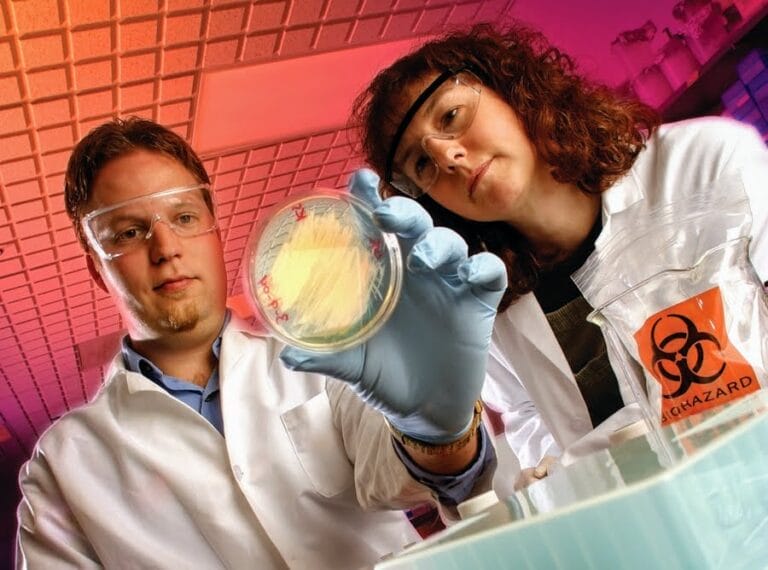
Master’s program in human behavior helps students use data science to solve pressing problems
John Curtin, University of Wisconsin–Madison professor of psychology, saw a problem: “In the U.S., we’re not great at getting treatment services to people with substance use disorders, and we don’t support them well long-term,” he says.
Curtin got a National Institutes of Health grant to devise a solution: A mobile phone app that helps prevent relapse among people recovering from addiction.
Now Curtin is teaming up with colleagues in psychology and other fields to teach students to use data to solve any number of practical problems through the UW–Madison’s new MS in Psychology: Data Science in Human Behavior (DSHB) program.
“Most programs target computer science or statistics majors — people who already have programming and quantitative skills and lack grounding in social science critical to many problems,” says Tim Rogers, DSHB program director and professor of psychology. “Our program flips the script. We provide direct, hands-on training in data science tailored to suit people with a social science background.”
Tackling substance use disorders with data science
In his TEDx talk from fall 2021, Digital Therapeutics: Mental Healthcare at our Fingertips, Curtin shared a deeply personal story that inspires his work: his dad’s struggle with alcohol use. Curtin focuses his research on psychological and neural mechanisms that are involved in risk, prevention and intervention for patients with alcohol and other drug use disorders.

Recently, Curtin marshaled the power of mobile technologies to monitor experience, behavior, social interactions and physiology of people with substance use disorders in their day-to-day activities. Using GPS, texts and other phone data, his app detects personalized signals that a participant may be relapsing — from where they are to who they are with — then guides them to seek support from friends, treatment providers or a health app.
“With large data sets of individuals in recovery, we are building models that predict with high precision when someone who’s in recovery for substance use disorder will lapse back to use,” Curtin says. “We can look at data over time to suggest how much you might be at risk at any moment.”
Curtin and his team believe this project exemplifies the Wisconsin Idea — taking research out to benefit people in all areas of the state — and that they can make a difference in the raging battle against alcohol and drug use disorders.
MS in data science shares useful tools
Curtin is teaching a class in applied machine learning in the new MS in Psychology: Data Science in Human Behavior program. He’ll bring his own research forward and have opportunities for students to join his team or come up with their own projects.
The DSHB program is a 16-month, in-person, accelerated master’s program consisting of 33 credits. Students will receive rigorous training in statistics and learn how to apply machine learning and other contemporary data science tools to large datasets. They will learn how to interpret and present their findings to diverse stakeholders.
Students will also take two electives, participate in a professional development seminar and complete a hands-on capstone team project.
“The capstone project will be exciting,” Rogers says. “Students will get to work with off-campus partners to solve problems in a real-world setting, allowing them to network and make career contacts.”
Curtin adds, “The tools and the skill sets that we’re developing in this course can be immediately applied. It’s been exciting to me to be on the cutting edge to develop interventions and to have those interventions quickly applied with patients. Having an impact on people’s day-to-day lives is rewarding.”
Need for data science experts on the rise
Demand for data scientists increased by 50 percent in 2020 across health care, media/entertainment, finance, insurance and telecommunications sectors, according to the Dice 2020 Tech Job Report.
The Bureau of Labor Statistics reports that data science is in the top 20 fastest-growing occupations, and it’s been the fastest growing occupation for the past three years on LinkedIn’s Emerging Jobs Report with 37 percent growth in 2020.
The explosion of data science has changed the ways companies, government offices and nonprofit organizations track how people purchase and utilize goods, interact with each other, comply with regulations and support philanthropy and social causes.
“No matter what your interests are in a career, it’s going to require data scientists,” Rogers says. “Our graduates will understand how to apply data science methods to solve issues related to individual and collective human behavior — some of the most common problems in every sector.”
He adds, “Science advances best when all minds contribute, and all voices are heard. For this master’s program, we are seeking minds and voices that have been marginalized in STEM fields, including those of women and members of underrepresented groups.”
The deadline to apply for the MS in Psychology: Data Science in Human Behavior program is March 31, 2022. For more information, see the program website or email Pat Walsh at [email protected].
To learn more about this program and about how to make an impact with data science, attend the webinar Social Impact: Data Science for Social Good, February 9, noon to 12:30 p.m. CST.
Published on Jan 25 2022
Last Updated on Jul 11 2024
Categories: Professional Degrees & Certificates
Next Post
Badger Precollege on La Movida



